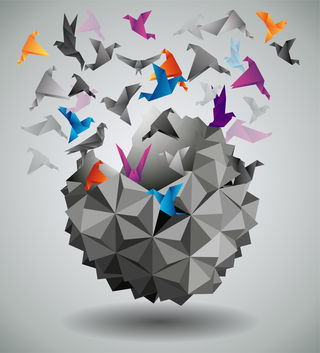Unconscious
What Is the Most Important Activity for Self-Transformation?
Would you like to grow and transform? Self-awareness is key.
Posted October 25, 2019 Reviewed by Kaja Perina
When I run workshops and retreats, this is the most popular question students ask me: “Which activity should I focus on to enhance my personal transformation?” It makes sense; we all have a natural tendency to grow, transform, and live life as fully as we can. It is an internal drive to experience deeper fulfillment. At the same time, many of us are very busy, and we wish to maximize the impact of any transformation-supporting activities. So the question is important. And my answer? Simple, it’s the good old “Get to know yourself.”

Why is Self-Knowledge So Important?
Before we go into the “How” of getting to know yourself, let’s understand the “Why.” Most of us are unaware of crucial pieces of our own personal “self”. Those are pieces we buried at the darkest corner of our consciousness (Jung called it “shadow”), and we are not consciously aware of their impact—and yet they impact us profoundly. We talk to people, make decisions, engage with life, choose work, and perform any other human interaction, under the influence of those deeply buried pieces of ourselves.
And we do it all unconsciously—so that when I contemplate a new professional path and decide not to go for it I might explain it rationally with “I don’t have the required level of experience/education” while the truth is that the unconscious piece from within me was the actual decision-maker here, by sending the internal message of “I am not good enough to do this” or “I am not worthy of this opportunity” (both of which are popular unconscious internal messages)—and if I don’t do the workaround self-awareness, I would probably insist that it is about the rational explanation, because the unconscious internal message is whispered so quietly within me, that I won’t hear it consciously. I would make choices according to it, but I won’t hear it. This “lack of self-worth” deeply buried idea about myself is just an example, there are numerous potential judgments, ideas, perceptions, assumptions, and feelings that I could be carrying in my own personal shadow.

Self-Knowledge: Moving from Shadow Into Light
Through the process of increasing self-awareness, and gaining greater self-knowledge, those pieces gradually shift from darkness into the light, from the unconscious into the conscious. They stop hiding in the shadow, and they become integrated into the “self” that you can see and recognize. Frequently, it is not a fast process (it could take a long time, depending on how deep in your shadow is the piece sitting), and it might even be a painful process.
The pain is due to the fact that there might be a reason behind the piece’s location in shadow of your psyche—it might be a threatening dimension of yourself, or a scary one, or one that is linked with some trauma or difficult past events—and you have pushed it into the unconscious so that you won't have to “meet” it as part of conscious awareness of yourself. If there is some link to traumatic events in your life, then the transition from shadow into light has to be done gradually, with caution, and deep respect to your personal tolerance—if it feels too much to engage with, take a step back and re-connect with this piece, as much as you could comfortably can, at a later time. And yet, such engagement is crucial if you wish to gain the freedom from unconscious dimensions of yourself impacting your life choices and interactions.
Short Video On the Beauty of Self-Awareness
This is a short excerpt from the film “Essays from the Heart: Emergence from Within,” by Anjula Ram, in which I talk about the importance of seeing ourselves fully, as we are, without any masks:
Psychological Research About Self-Awareness
Psychological research confirms the importance of self-awareness. It shows that self-awareness is crucial for us to experience self-development, take the perspective of others, exercise self-control, produce creative accomplishments, and experience high self-esteem. Research also shows how self-awareness leads to increased self-care and decreased burn-out. Finally, research indicates that increased self-awareness leads to greater acceptance of oneself and others. I could go on, listing many studies showing the benefits of self-awareness, but the point is clear: scientific research shows that self-awareness is an essential component in our psychological wellbeing.

Increasing Self-Awareness: Practical Steps
Ok, so you understand and accept the importance of self-awareness—but how do we turn it from an abstract insight into a practical change in our lives? Below is a list of activities that would potentially increase your self-awareness, providing you with greater self-knowledge.
Please remember that the journey of meeting yourself is radically personal and unique to your own relationship with yourself. The activities below are only suggestions to trigger your curiosity – there are numerous ways for you to meet yourself. Each of us would find some of those activities highly relevant and applicable, while others would feel less relevant – that’s perfectly natural – find those that would work best for you:
Therapy/Coaching – a great way for us to increase self-awareness. Working with someone (and it could be a therapist, counseling psychologist, clinical psychologist, coach, or any other similar practitioner) would provide you with a healthy environment for self-reflection in which you could observe yourself without judgment.
Study – contemplative education is based upon introspection. You could take courses, workshops, retreats, and other learning opportunities that are inviting self-awareness. Those courses do not have to be titled “Self-awareness” – they just need to have the juice of introspection interwoven into their teaching. For example, mindfulness courses, and different mental health practitioner courses would offer you such introspection as they invite you to observe your own patterns and way of being.
Connect with Nature – Many people experience a reduced cognitive “noise” while spending time in nature. This peaceful state of mind is an excellent space to meet yourself.
Learn New Skills – When you learn a new skill, you learn about your personal boundaries, your comfort zone, and find ways to move beyond it. As part of this process, you learn about yourself and ways to expand that self.
Read – Certain books are written with an intention to invite self-observation. They will trigger questions and insights that would lead to greater knowledge of yourself. Examples of such books include “Become What You Are” by Alan Watts, “The Gifts of Imperfection” by Brené Brown, “What I Talk About When I Talk About Running” by Haruki Murakami, and my own “Awareness is Freedom: The Adventure of Psychology and Spirituality”.
Meditate – Meditation invites you to meet yourself. If your attention is not wandering into stories, it has to sit still and observe in-the-moment thoughts and emotions. You will get to see, first hand, the patterns of your mind. This might not be easy or comfortable, but you will learn so much from this simple experience of meditation.
Ask for Feedback – Other’s perspective could provide you with interesting insights. It would have to be someone close to you, or someone who knows you well. Ask this person questions about yourself – and begin by stating that you are truly open to hearing any reflection they could offer. The insights they share might not be 100% accurate, but they would provide you with some food for thought.
Self-Awareness: Until the Day that You Die
I have been actively engaged with this self-awareness journey for 25 years, and every time I shed light over a new insight, an internal idea about myself that I have been holding in the dark, there’s a brief thought of “maybe this is it? Maybe I have now seen myself fully?” – and then a day, a week, or a month later, life would slap me in the face, and I would be invited to see a new piece that was hidden within.
Like an onion, I keep peeling and find new layers. I have learned to rejoice in this process of discovery, even when it is frequently painful, even when every blood cell in my body is shouting “avoid, move away, this is unpleasant” – I have learned to embrace this process – it is the journey for which I have chosen to come here, to this life, the journey of meeting myself.
The author Richard Bach said, “Here is a test to find whether your mission on Earth is finished: If you're alive, it isn't.” And you are alive, so keep on looking at the mirror, look closely, you might be surprised by what you find.
Dr. Itai Ivtzan is a positive psychologist, Professor at Naropa University, and the director of the School of Positive Transformation. You can find his books and scientific work on his personal website and his courses on his school’s website. Dr Itai ivtzan is available for speaking engagements and keynotes – contact him through his personal website.




